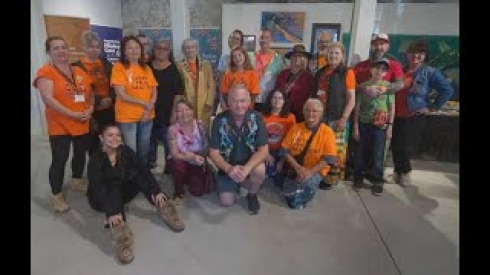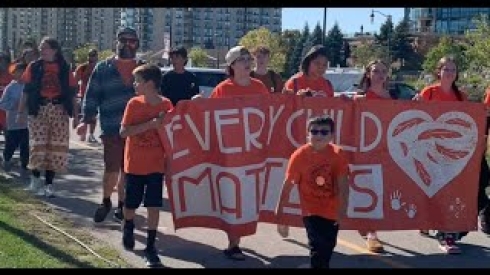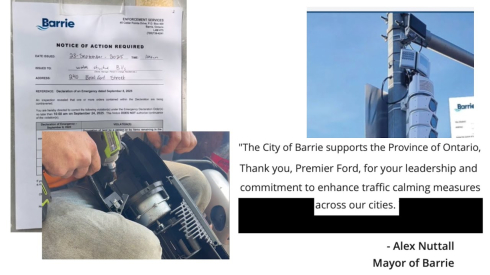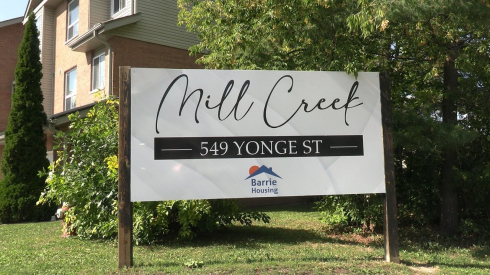- Start playing the video
- Click CC at bottom right
- Click the gear icon to its right
- Click Subtitles/CC
- Click Auto-translate
- Select language you want
City of Barrie Declares State of Emergency, Citing Encampment Crisis
On the morning of September 9, Barrie Mayor Alex Nuttall declared a state of emergency in response to the city’s growing number of encampments. According to the mayor, there are currently 19 encampments within Barrie’s boundaries, with two having been cleared in the past two weeks. The announcement marked a significant escalation in the city’s response to the ongoing housing and homelessness crisis, placing the issue firmly at the center of local political debate.
“Since day one I have been clear that encampments are not acceptable in the City of Barrie,” Nuttall stated at the press conference. “We are here to help those who want help, and there are resources available today. If you refuse that help you cannot stay in these encampments.” His remarks underscored a hardline position that has become increasingly common in municipalities across Ontario, where local leaders are struggling to balance public concerns about safety and livability with the urgent needs of unhoused residents.
Although the mayor spoke firmly about clearing encampments, he did not provide specific details about where displaced residents would be relocated. He did, however, reference a church on Mapleview Drive that has recently been converted into transitional housing, suggesting it could serve as one of the short-term solutions. Beyond that, the city plans to strike a task force as part of the state of emergency, which will focus on immediate measures to address the housing crisis and long-term strategies to reduce the reliance on encampments altogether.
In his remarks, Nuttall also pointed the blame at previous administrations, arguing that years of inaction had compounded the problem. He noted that while the County of Simcoe holds formal responsibility for social services in Barrie, the city “cannot wait any longer” for outside solutions. This framing highlights the growing tension between municipal governments and the county or provincial authorities responsible for funding and administering housing programs—a tension that has left many communities in limbo as the crisis deepens.
One of the most notable aspects of the announcement was who was not at the podium. While several city councillors stood alongside the mayor, no representatives from social service agencies, outreach organizations, or advocacy groups were present. Their absence raised immediate questions about the degree to which those with frontline experience will be included in the task force or in future planning. For many advocates, this has long been a sticking point: policies are made, but the voices of those most directly affected—or those most experienced in addressing homelessness—are often sidelined.
Critics of similar approaches in other cities have warned that clearing encampments without providing sufficient housing alternatives simply moves the problem from one location to another, often deepening mistrust between unhoused individuals and local government. Whether Barrie’s state of emergency will create new opportunities for collaboration and investment, or whether it will fuel further division, remains to be seen.
What is clear, however, is that the decision signals a turning point for the city. Declaring a state of emergency is not a symbolic act—it provides Barrie with greater flexibility in reallocating resources, coordinating with other levels of government, and implementing new measures more quickly. It also sets a political tone: Nuttall’s administration is determined to show visible action, even as questions remain about the sustainability and humanity of the city’s approach.
For now, Barrie’s residents—both housed and unhoused—are left to watch closely as the city prepares its next steps. The encampments, scattered across parks, riverbanks, and vacant lots, have become both a symbol of the broader housing crisis and a flashpoint for debate over how best to respond. Whether the newly announced task force will engage with community partners, prioritize long-term housing solutions, and address the root causes of homelessness will be the true test of the state of emergency.
Add new comment
Simcoe Community Media is a non-profit media organization based in Barrie, Ontario, specializing in civic journalism. Our mission is to foster an informed, connected, and vibrant community by amplifying diverse voices and perspectives, promoting transparency, and encouraging public discourse.





We encourage comments which further the dialogue about the stories we post. Comments will be moderated and posted if they follow these guidelines:
The Community Media Portal reserves the right to reject any comments which do not adhere to these minimum standards.